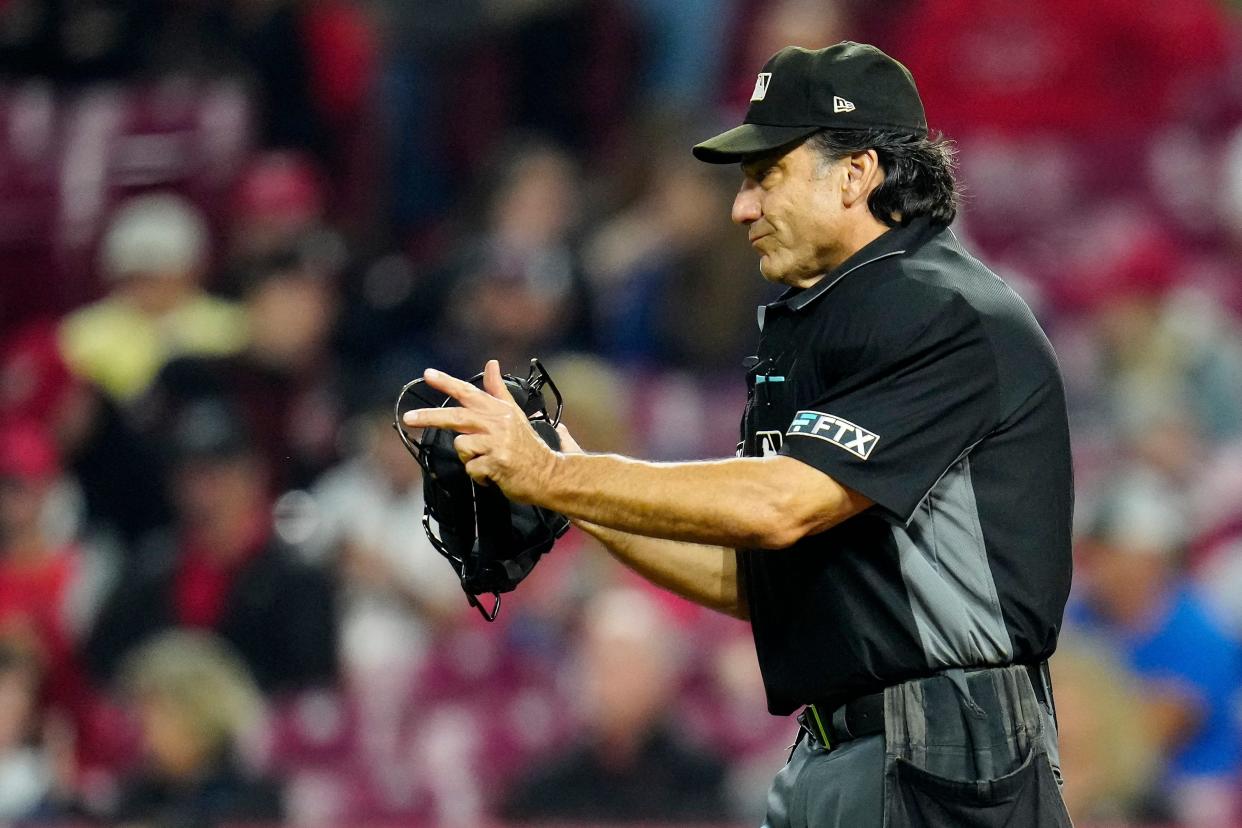The thought of using robot umpires in baseball is enough to make this writer short circuit

WORCESTER — As a whole, we believe in abbreviation except when it comes to lifespan.
We have GOATs and POTUSes but as of yet, no WOATs or VPOTUSes. They will get here eventually, though.
Baseball’s newest abbreviation is ABS, the short version of robot umpires. What used to be called a dump is now a sanitary landfill, and here is one opinion:
Robot umpires belong in the sanitary landfills of ideas.
They are making their debuts this season at Polar Park, and other places in the baseball world as part of rules revisions intended to make the game more enjoyable to watch.
Having endured the newspaper meltdown of the 21st century, I know one thing — technology has an endless capacity to eat its young. The arrival of computers allowed publishers to replace humans with technology that did not get weekly paychecks, did not require health insurance, never went on strike and worked overtime without complaining.
The resulting profits were enormous. Of course, computers also gave birth to the internet, rendering newspapers irrelevant and turning those profits into bankruptcy proceedings.
With robot umpires, baseball is embarking on a course of action that will bring into play one of nature’s most irrevocable statutes, the Law of Unintended Consequences. Baseball, more than any other game, is based on imperfection and the reaction to it. The computerians who seek to minimize the chaos of the ball in play are ridding the game of its essence — the excitement of the ball in play.
More:WooSox open season Friday: '9 things you should know'
Baseball is the most wonderfully imperfect game ever invented. What other sport rewards failure like baseball does? A batter can swing at a Strike Three so unhittable that not only does he miss it, the catcher can’t catch it.
And for that level of incompetence, he is allowed to reach first base, something a 410-foot fly ball to the Fenway Park triangle would not necessarily do.
Baseball has flirted with attempts at perfection. Take the Astrodome in Houston. Perfect symmetrical dimensions. Perfect controlled climate. The builders forgot one thing — grass, a living organism, needs sunlight to thrive. Enter Astroturf, a plague on the game.
The Astrodome, and its symmetrical dimensions and predictable bounces, led to a generation of boring ballparks. That trend was reversed by our own Larry Lucchino and Janet Marie Smith, who turned imperfection and unpredictability into a fashion statement with the construction of Camden Yards.
More:North High champs to throw ceremonial first pitch at WooSox opener at Polar Park
If the technology is there for an automatic strike zone, it can be there for essentially every call on the field. Just because we have the technology does not mean it has to be used. Baseball is the best officiated of all the main sports. Almost all the calls are binary. Fair or foul. Safe or out. Ball or strike.
Checked swings and the infield fly rule are judgment calls, but that’s about it. There is no debating why holding or pass interference was called on this play, but not the one before, etc.
Major league umpires are being constantly scrutinized and evaluated and are remarkably accurate and consistent — not perfect, but close — in their calls. This is a case where technology is not needed. The way baseball has officiated games has worked for decades and still does.
Plus, I miss the arguments.
It has become a lost art, arguing. There are times I feel like throwing my laptop out the window, but I can’t argue with it. Frustration is human. Interaction is human. It is fun, especially if you are watching someone else do the arguing.
The Red Sox have not had a truly great arguer since Joe Morgan, although Bobby Valentine deserves a nod in that direction. The GOAT arguer was Baltimore’s Earl Weaver, and the game needs more Earl Weavers, not fewer.
One of the great baseball clips of all time is Brooklyn’s Jackie Robinson stealing home against the Yankees on Sept. 28, 1955, in the World Series. The plate umpire was Upton’s Bill Summers. The Yankees catcher was Yogi Berra.
Berra argued ferociously that Robinson was out, and enhanced replays these days still leave the call as an open question. Berra never forgot it. About 50 years later, Summers’ grandson Ricky met Berra at a baseball card show, and when Berra made the family connection, he almost re-created the 1955 argument shouting at Ricky Summers, “Your grandfather was wrong! Robinson was out at home. He had no angle to make that call.”
Do we really want to erase memories like that from the game?
What’s next, automatic foul poles? Then, instead of Carlton Fisk’s 1975 home run bouncing off the yellow pole and into left field and delirium ensuing, we look for some message flashing on a scoreboard.
Not the same.
We generally gain and lose things incrementally, like weight. An ounce a week is three pounds a year. Three pounds a year is 30 pounds a decade. It is hard to get it to go back the other way.
In terms of technology, the time has come for robot umps it seems. Actually, the time will never come for robot umps. It is just the start of turning baseball into some sort of abstract event in which all that matters is the numbers, not the people who create them.
Increments. Robot umpires are just the beginning.
—Contact Bill Ballou at sports@telegram.com. Follow him on Twitter @BillBallouTG.
This article originally appeared on Telegram & Gazette: Robot umps latest example of baseball changing a timeless game

